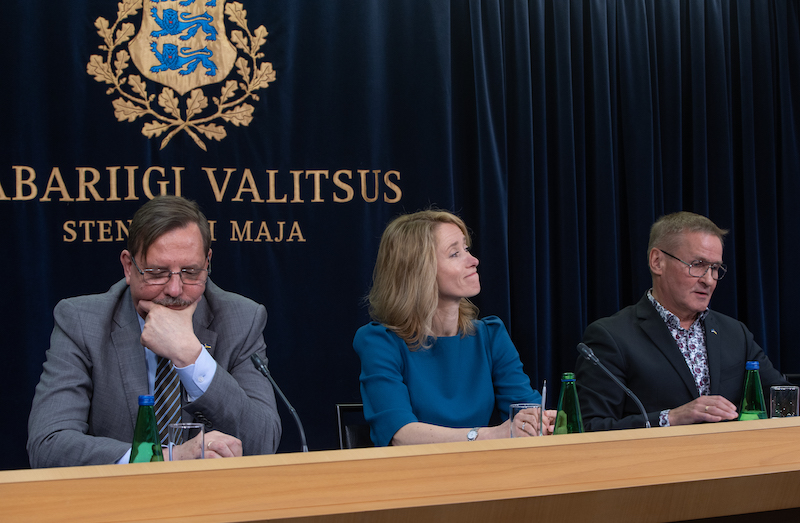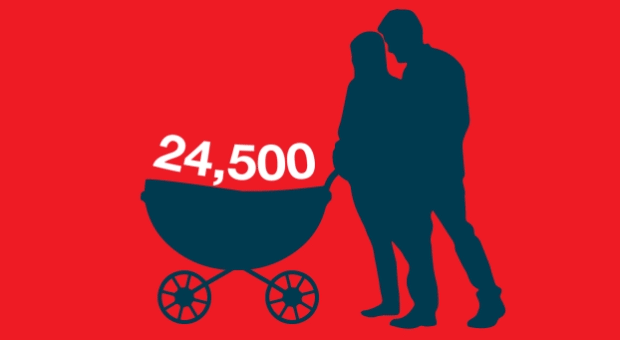Hi from Warsaw,
The recent debate in Poland on the low birth rate has shown once again that women are treated as instruments by politicians.
This was shown by Jaroslaw Kaczynski, leader of the Law and Justice party, and back-seat ruler of the country. At a meeting with voters, he said that the low birth rate was due to women abusing alcohol at a young age.
An uproar ensued, with many women (rightly) finding his words offensive. Kaczynski himself has no family, has never married, and nothing is known about his relationships with women or men, but he is always keen to speak out on family issues. Men deciding for women is unfortunately typical of Poland. When a journalist invites politicians to a TV studio debate about abortion rights, only men speak.
In Spain, Italy and North Macedonia, politicians also have their mouths full with concerns about the country’s demographic situation. But does the voice of women still count in all this?
Michał Kokot, this week’s Editor-in-Chief

“You are a part of our population growth problem,” Martin Helme, the current leader of the far-right Estonian party EKRE, told a 27-year-old female journalist in 2016.
She had asked him if it was wrong that she was not planning to have children at that time. He also called her a “socially harmful element”. This quote has since become infamous in Estonia’s ongoing baby debate.
Although this statement was condemned by liberals, it did not damage EKRE’s popularity. Since the fall of the Iron Curtain, Estonia has experienced a rapid decline in its birth rate.
However, Tallinn University demographer Mark Gortfelder has pointed out that the existential fear of demographic “survival” has existed longer than the 104-year-old-republic.
Estonia experiences the issue of survival more literally than in most other parts of Europe. Every regional power has at some point in history controlled the Baltic nation of today or a large chunk of it. Most of these periods have involved a massive loss of Estonian lives.
Estonia’s first period of de facto independence (1918 to 1940) was ended by World War II, and accompanied by mass killings and deportations. Between 1945 and 1989, migration increased the proportion of the non-Estonian population within the Soviet-controlled republic from 3% to 38%. It was feared that Estonians would soon be “a minority on their own land”.
For all these reasons, the “baby-making” narrative falls on fertile ground in Estonian politics.
For prime minister Kaja Kallas, this meant ditching her coalition partners who, together with EKRE, introduced a bill for a massive increase in family subsidies behind her back. Many experts say that these will not significantly increase the birth rate.
The price for Kallas to keep her job was high. Her new coalition partners demanded lavish subsidies for families. It was exactly because of those that the previous government was ousted.

In Hungary, all married couples can access an interest-free loan of 24,500 Euro (or 10 Million HUF). No repayments are due for three years after the first child is born, 30 percent of the debt is waived after the second, and the entire debt is waived after the third.
Backed by the government slogan “family-friendly country”, this financial benefit is only valid as long as citizens fulfill their ‘domestic’ obligations.
If the couple divorces or has no children before their fifth anniversary, this support turns into a penalty: not only is the loan at market rate, but the couple must pay back the subsidized interest rate to the state.

I come from a Catholic family. I have three sisters. But when I think about having children, what I see is the uncertainty of the future.
After the 2008 crisis, the Spanish labor market suffered a shock. What used to be ‘a company you always worked for’ transformed into unemployment queues. We received the ‘firing flexibility’ but without the perspective of a fast re-hiring in another company.
Now, if I don’t know whether I will still have a job in five years’ time, how am I going to embark on a long-term commitment like having a child?
When I hear drastic warnings about the shrinking of the European population, fears that Spain’s birth rate is among the lowest in Europe, or politicians blaming young women and their lifestyle for this situation: it’s always on women.
The blame for the decline in birth rates only falls on women joining the workforce (it’s true!), women wanting to focus on their careers (also true!) and even ‘selfish’ women trying to enjoy longer child-free years of youth (more truths!).
But when politicians address natality, it is never about housing, economic insecurity, the labor market, or the cost of living. Government policies should approach the problem in a holistic way. Unfortunately, it has always been a disappointment.
Instead of trying to convince me to have children, the Government could try to fix the housing market. After years of unstable employment, I was 27 years old when I got my first fixed contract. In Madrid, where I live, finding an affordable house with more than two rooms in a normal neighborhood is an ordeal. And forget about buying a place.
How could I think about having a child without a house to raise them? Let alone four kids, like my mother.

“‘Don’t worry. It happens sometimes due to paperwork. Meanwhile, borrow some money if you can’ – This is what I was told when I asked the Public Health Fund why my maternity leave payments were overdue. It happened last year after I gave birth to my second child. The money started arriving after a three-month delay. As a single mother with a newborn, this delay became really stressful. I had to borrow money from my parents. I can’t understand how the state could leave me like that when I was at my most vulnerable.”
In North Macedonia, the state fund covers 100% of a mother’s wages during maternity leave. But Lidija Stancevska, 43, from Skopje, told us that mothers are sometimes left penniless before the state’s ‘helping hand’ arrives.
Meanwhile, the country is gearing up for a public debate on extending maternity leave from nine months up to one year. But what good is a formal extension if the cash turns up late?

Would you say that a woman’s life is worthless if she doesn’t have children? This seems inconceivable in a European country. But this is exactly what we are experiencing in Italy.
Under the new far-right government of Giorgia Meloni, the idea of supporting families goes hand in hand with propaganda, and that’s where problems arise for women.
Nothing explains it better than this sentence by Isabella Rauti, daughter of the founder of fascist Italian Social Movement party, Pino Rauti. In May, she spoke at the conference of Fratelli d’Italia, Meloni’s party, as a head of the Family department. She said: “Without children, without the joy of being continued, there is no future, there is nothing.”
Once in government, Meloni set up the Ministry of Natality, whose minister Eugenia Roccella has previously stated that abortion is “not a right”. This week, while launching the budget bill, the government prepared a reform to the pension system.
It allows earlier retirement to women who have more children. The more children you have, the earlier you can retire. What if you cannot or do not want to have children? Has your partner any role?
Behind the smokescreen of propaganda, the stark reality remains: women need a supportive welfare system and fair wages, otherwise there is little point in talking about family, traditional or otherwise.
Giorgia Meloni, who made being “a woman and mother” her brand, leads a party that voted against the equal pay directive in the EU. In Italy, her first obsession is dismissing the universal basic income. For now, the ability to help families seems “much ado about nothing”.
What happens when propaganda interferes in women’s lives has already been shown. After Fratelli d’Italia won local elections in the Marche region, the right to abortion was put under threat.
Thanks for reading the 9th edition of European Focus,
Although European politicians recognized demographic problems a long time ago, they are still unable to properly identify their causes. The voice of women in the debate on their rights, although increasingly stronger, is still not heard enough.
Movements for women’s rights are growing more powerful and it may not be until the next generation that this changes. Which is something I wish not only for women, but for men too.
Feel free to comment and send in your thoughts on this edition of the newsletter.
See you next Wednesday!
Michał Kokot







